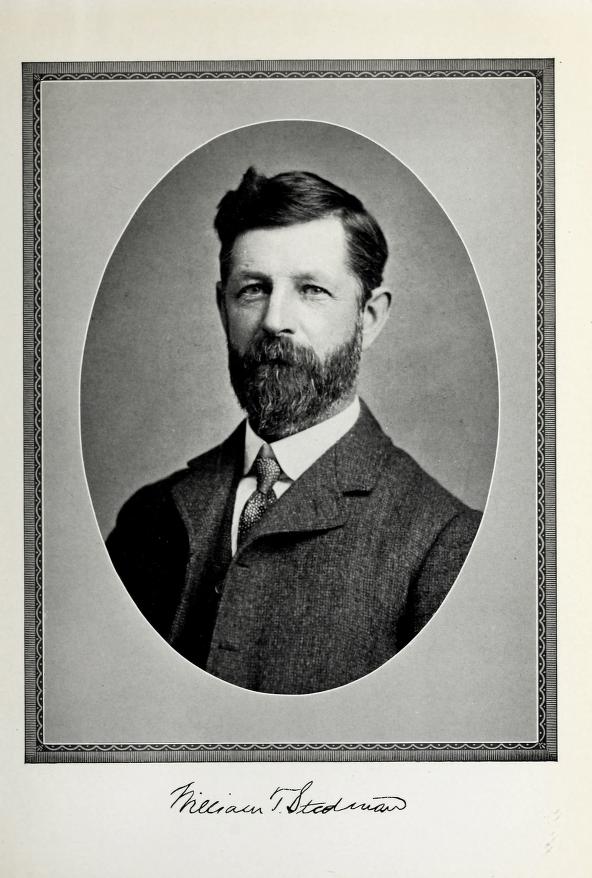Hon. William T. Stedman — Active in many different branches of the life of Rhode Island, of which he was a native, William T. Stedman was a leader in business, as well as in civic and social affairs. Ever interested in promoting the welfare of his State and its people, he served well in public offices of numerous descriptions, and rendered services that were of value both to his community and his State as a whole. Thoroughly upright in character, of unfailing integrity, he well earned the respect and the affection of those who were associated with him; and by his quiet and undemonstrative nature gained many ends that might have been denied to many individuals of different qualities. His career was a most useful one in Rhode Island life; and his death took from this State one of its helpful and substantial citizens.
Mr. Stedman was born in Wakefield, town of South Kingstown, Rhode Island, son of William and Jane Dorcas (Clarke) Stedman, and was educated in the old Kingston Academy. While very young, he became engaged upon the first work of his career, having become, when only seventeen years of age, a clerk in the counting room of the Peace Dale Manufacturing Company, at Peace Dale, Rhode Island. Thereafter he was promoted steadily, winning his advancements by his own efforts and entirely as a result of his energy, until at last he became assistant treasurer of the company. He acquired an extensive interest in the affairs of this corporation, but did not continue in active work in this connection after his retirement in 1916.
Along with his commercial activities, Mr. Sted-man took part in many different phases of political and civic life. He gave his support to the Republican party, whose policies and principles he regularly supported, and he was one of the leaders of his party’s organization in Wakefield. He served as clerk of the Wakefield School District and as sealer of weights and measures; while he was also a member of the Town Council for five years, and president of that body for four years. In 1901, he was elected on the Republican ticket as a representative to the General Assembly of Rhode Island, and so well did he fulfill his duties in that office that he was reelected in each year for three more years. In 1908 he was elected State Senator from his district, and in that position he repeated his excellent record as a legislator. For twelve years he was town treasurer of the town of South Kingstown, and from 1925 until his death served as town tax collector. For a period of about four decades he was treasurer of the Union Fire District, having been elected to that position at the time of its organization. He was a member of the Republican State Committee of South Kingstown. His business career also included participation in the affairs of the Narragansett Pier Railroad, of which he was for many years secretary and treasurer. For twenty years he was treasurer of the Peace Dale Congregational Church, and was always an active contributor to the support of this parish. Into all of his activities, Mr. Stedman continuously put forth his best energies and his fullest measure of devotion, with the result that he was esteemed and respected in a wide circle of friends and acquaintances and was able to render outstanding service to his community and State.
William T. Stedman married Sarah Clarke, daughter of James B. Clarke, a lifelong resident of Peace Dale, Rhode Island. By this union there were two children: 1. Oliver H., an electrical contractor and one of the enterprising younger men of his community, who is now president of the Wakefield Town Council. He married Marjorie E. Clarke, and they have one daughter, Phyllis. 2. Lucy R.
The death of William T. Stedman occurred on June 12, 1929, and was a cause of widespread sorrow among his fellowmen. He was esteemed among all who knew him as an enthusiastic citizen and a faithful public servant, one who discharged his duties faithfully and well, both in business and in public life. He devoted himself tirelessly to the task of promoting the best interests of his community; and for his achievements in town and State offices, as well as in his own personal life, he will be remembered for years to come; and many individuals who were his close personal friends will find in his memory a source of constant encouragement and inspiration. And they will find this basis valuable as a model for their own lives in the future.
Source: Carroll, Charles. Rhode Island: Three Centuries of Democracy, vol 4 of 4. New York: Lewis historical Pub. Co., 1932.

